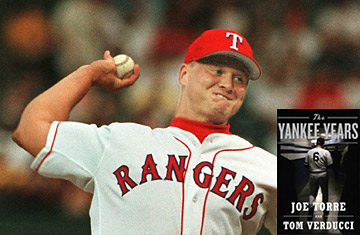
Texas Rangers pitcher Rick Helling in 1998
(2 of 3)
There was only one way for baseball to react to this kind of whistleblowing: Crank the music back up and keep the party rolling.
The union was having too much fun and making too much money to pay much attention to Helling's warning. It was far easier and financially prudent to ignore the issue, to assume that Helling was an alarmist prone to exaggerating, and to make sure everyone involved knew as little as possible about players injecting hard-core steroids into their asses. Don't ask, don't tell and don't care was the unwritten code of the day.
"What really bothered me was there were plenty of good guys, good people, who were feeling the pressure to cheat because it had become so prevalent," Helling said. "I firmly believed at the time that it was an unlevel playing field. I was trying to find a way to do something about it. Make it as fair of a game as possible. Play it the right way.
"When you see guys coming into spring training camp 30 pounds heavier than they ended the previous season, or they had gained four or fives miles an hour on their fastball, I mean, those things are not normal. My whole career was played in the peak of the steroids era. I saw guys throwing 87 miles an hour one year and 95 the next. Unfortunately, a lot of people, the press, the owners, the players, they turned the other cheek. I was like, 'Are you serious? Can't you see what's going on? Are you seriously going to let these guys get away with it?'
"Unfortunately, it turned out just the way I thought it would. It blew up in our face."
The union's executive board paid little attention to Helling. The owners were of a similar mindset. In fact, within a matter of days of Helling sounding an alarm that went unheeded, baseball provided official proof that steroids were not considered an urgent problem. At those same 1998 winter baseball meetings in Nashville, baseball's two medical directors, Dr. Robert Millman, who was appointed by the owners, and Dr. Joel Solomon, the designee of the players, delivered a presentation to baseball executives and physicians about the benefits of using testosterone. Angels general manager Bill Stoneman was so surprised at the tone of the presentation — basically, the message he heard was that no evidence exists that steroids were harmful — that he wondered why Major League Baseball even had allowed it.
Also in attendance was Dr. William Wilder, the physician for the Cleveland Indians. Wilder was so disturbed by the presentation that he wrote a memorandum to Indians general manager John Hart that whether testosterone increased muscle strength and endurance "begs the question of whether it should be used in athletics." Wilder also endorsed sending information to players about the "known and unknown data about performance-enhancing substances."
Wilder also spoke directly with Gene Orza of the players association. Orza advised him to hold off on any education about supplements until more information was available. Wilder was incredulous. Of Orza's request to postone any action, the doctor wrote, "That will be never! Orza and the Players Association want to do further study ... so nothing will be done."
Orza infamously revealed the players' position on steroids more blatantly in 2004, even long after the lid blew off the steroid epidemic in baseball. Speaking as part of a panel discussion in a public forum, Orza said, "Let's assume that [steroids] are a very bad thing to take. I have no doubt that they are not worse than cigarettes. But I would never say to the clubs as an individual who represents the interests of players, 'Gee, I guess by not allowing baseball to suspend and fine players for smoking cigarettes, I am not protecting their health.' "
